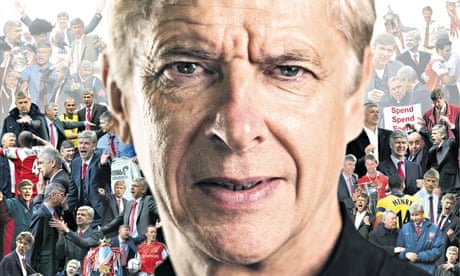Before Arsène Wenger's weekly press conference at Arsenal's training ground he was subjected to a slightly awkward ceremony in front of a gaggle of waiting journalists, during which he was presented with a surprisingly small shiny gold cannon in commemoration of his imminent 1,000th game in charge of the club. "I hope it gives you as much pleasure as the years of football have given everybody else," Arsenal's chairman, Sir Chips Keswick, said, a little hopefully, as Wenger took ownership of his trophy, politely feigning something resembling delight before ducking off to wade through his customary hour with the press, devoted on this occasion to the heavily trailed topic of his own longevity.
For a man who remains obsessed with the immediate business of football – Mark Hateley, who played for Wenger at Monaco, described him as "a football alcoholic" – Wenger does a pretty good job of dealing with the endless distractions at the edges of his triple-tier role as Arsenal's coach, manager and chief financial planner. Everyone has the right to be a little forgetful, though, and it should be noted for the record that the cannon was later spotted in a stairwell behind the press room. No doubt it will be retrieved, with all due ceremony, at some later date.
And in fairness Wenger could be excused a little impatience with the level of hoopla before his 1,000th game in charge of Arsenal, which arrives against Chelsea at Stamford Bridge on Saturday. No doubt the passing of Sir Alex Ferguson from the touchline last summer – which leaves Wenger a full 14 years ahead of the rest of the field in the longest-serving Premier League manager stakes – has added to the sense of hubbub around what is on the face of it a fairly arbitrary numerical milestone. There is perhaps a fascination with such constancy in the middle of a wider flux. And beyond this even a sense of beginnings as much as endings, the suspicion that Wenger – at 64 still furiouslyenergetic beneath his indestructiblesilver bouffant – is now ready to enter a troisième age of renewed prosperity after the trophy-less years of consolidation while the new stadium was built.
"I felt part of my responsibility was to push the club through that difficult period as well as I could," Wenger says now of a period during which he might have left to manage England, Bayern Munich or Paris St-Germain. "I knew from the start our financial viability was linked with us being in the Champions League or not. You can imagine how much I did sweat for years in the last three months [of the season]. It was maybe not the most prolific period on the trophy side but maybe one day I will look back on it and that will be the period I am most proud of."
Certainly the interminable debate over Arsenal's progress in the period since their last FA Cup victory in 2005 has yet to reach its end point and, indeed, the tone of Wenger's ultimate legacy could yet depend a little on what happens next. Some parts of English football have never quite forgiven him for the sheer censorious sweep of his initial impact, the role of gloomily resolute overseas moderniser that Wenger had little choice but to play. From this distance it seems clear Wenger was simply a necessary device in the Premier League's evolution. He got here first, stumbling into English football's bachelor cave, swishing open the curtains, cleaning out the fridge, introducing grilled broccoli to the Arsenal canteen like a conjuror producing a beautiful white dove from a homburg hat and all the rest of it.
"I was a complete unknown. And there was no history of a foreign manager succeeding in England," he said. "I changed a few habits, which isn't easy in a team where the average age is 30 years. At the first match the players were chanting, 'We want our Mars bars!'
"At half-time in the first game I asked my physio Gary Lewin: 'Nobody is talking, what's wrong with them?' and he replied, 'They're hungry.' I hadn't given themtheir chocolate before the game. It was funny."
The Daily Mirror duly reported after his first press conference that the vice-chairman, David Dein, would be hoping "to persuade us the lanky M'sieur Wenger, despite sounding like Rory Bremner auditioning for 'Allo 'Allo, is 'ow you say, fantastique!", while in his first 12 years in English football he was called 'the professor' 703 times in the UK press (clarification: Wenger is not a professor. He does have a master's in economics).
Having survived one period of culture shock, Wenger is currently riding out a more diffuse kind of resistance having spent the last half a decade or so preaching the virtues of parsimonious economic planning over short-term pot-hunting. Happily it is a debate that will at last have to move on one way or another. Wenger accepts this is a brilliantly promising moment to be manager of Arsenal. There are those who maintain he could have spent far more aggressively all along and that Wenger has erred stubbornly on the side of caution. In February Keswick confirmed Arsenal were, cautiously, ready to spend again, with a rumoured £140m transfer fund available in the summer.
"Today we can fight with the top clubs financially again. I believe the club is in a very strong position," Wenger said. "For us it is coming out of that period now by delivering trophies and winning, competing again with everyone at the same level. You can only show that with trophies – and I mean the Premier League, FA Cup and Champions League."
For that to happen Arsenal will need to recruit. First priority will be hanging on to Wenger himself, who has yet to sign a new contract, and who again expressed the familiar non-committal intention to do so in due course. Beyond that Arsenal will need at least two centre-forwards, depending on whether Olivier Giroud does indeed return to France. Another young combative midfielder might be handy. A general injection of speed in wide areas or up front would be useful, and no doubt Wenger will indulge once again his fetish for indeterminate attacking midfielders, although Schalke 04's Julian Draxler looks to have finally slipped through the net.
For now Saturday's game against Chelsea is "the game of the season for us", with Wenger accepting victory against a José Mourinho team is overdue. "Yes, we have a bad record," he said. "I think as well we have made some good draws. The result tomorrow will be linked with the performance of the day. We come out of winning 4-1 against Everton, we drew 1-1 at Bayern Munich and we won 1-0 at Tottenham. We are on a good run so let's take the confidence out of this run to make another surprise tomorrow."
If it is for Arsenal's manager just another game, in the end there is at least an element of undimmed romance in his motivation for maintaining such unstinting longevity. "You always have to have it in your mind that you want people to wake up in the morning with a love of going to the stadium and for them to go home having enjoyed themselves. In fact, the real goal of professional football entails not just winning but also enabling people to discover the pleasure of watching something beautiful.
"Maybe I run after an idea of making the players perfect, having the ideal game, the perfect game. I run after that happiness week after week. Sometimes you touch it a little bit but, of course, it goes again and you fight to get it again."

